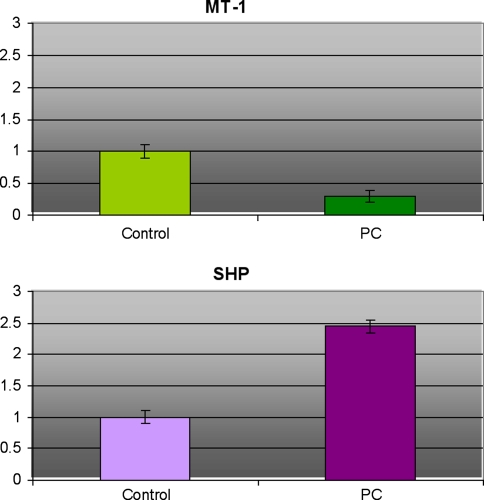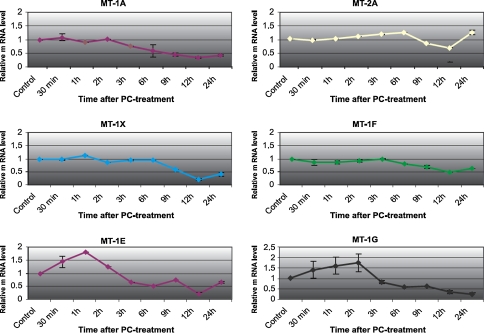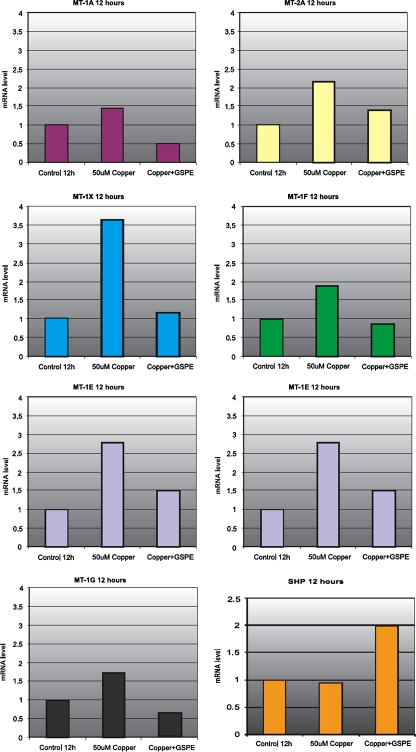Abstract
Procyanidins are the most abundant polyphenols in red wine and are also found in cereals, fruits, chocolate and tea. They exert many beneficial health effects, especially on the cardiovascular system (Bagchi et al. in Mutat Res 523–524:87–97, 2003; Williams et al. in Free Radic Biol Med 36:838–849, 2004; Dell’Agli et al. in Cardiovasc Res 63(4):593–602, 2004; Del Bas et al. FASEB J 19:479–480, 2005). Here, we show that oral administration of a grape seed procyanidins extract (GSPE) to healthy rats results, 5 h after treatment, in a 70% inhibition of metallothionein (MT) gene expression in the liver, as determined by oligonucleotide microarray hybridization. Similarly, in cultured human hepatocytes HepG2, GSPE downregulate the expression of MT genes at the mRNA level, as evaluated by quantitative RTPCR. Thus, mRNA levels of six functional MT genes, MT1A, 1E, 1F, 1G, 1X and MT2A, are diminished between 50 and 80% when HepG2 cells are treated during 12 h with GSPE. Only the expression of two human MT genes, MT1G and MT1E, is transiently increased during the first 2 h of treatment. GSPE-induced inhibition of MT genes expression is dose dependent, at concentrations that are not toxic for the cells. Our findings demonstrate that metallothionein genes are direct targets of procyanidins action, both in vivo and in vitro, in hepatic cells. Thus, this study will help to elucidate the mechanisms by which procyanidin exert their beneficial actions.
Keywords: Metallothionein, Procyanidins, Gene expression, Rat, Liver, HepG2
Introduction
Procyanidins (PCs) are the most abundant polyphenols in red wine and they are also found in cereals, fruits, chocolate and tea. Many epidemiological studies have demonstrated that moderate consumption of red wine is associated with reduced mortality and risk of cardiovascular disease. Also, numerous in vivo and in vitro studies have shown that PCs of red wine and other foods contribute to cardioprotection through different ways: they have a strong antioxidant capacity, act as anti-inflammatory agents, decrease arterial pressure and modify plasma lipid profile by lowering the atherogenic risk index. Some PCs have been shown to interact with specific cell surface membrane receptors and with proteins of intracellular signaling pathways, finally leading to the modulation of gene expression in many cell types and tissues [1, 2].
Metallothioneins (MTs) are a family of low molecular weight, cysteine-rich metal-binding proteins widely distributed and highly conserved among bacteria, fungi, plants and animals. They are important for the detoxification of heavy metals such as Cd and Hg, but in physiological conditions they are mainly involved in the control or Zn and Cu homeostasis. For instance, they are able to interchange Zn with zinc-finger-containing transcription factors. Basal expression of mammalian MT genes may be up regulated by heavy metals, oxidative stress (reactive oxygen species), pro-inflammatory cytokines (TNF-a, IL-1, IL-6), glucocorticoids and glucagon. Conversely, MT expression can be repressed by agents that promote DNA methylation or histone deacetylation. All these agents modulate MT gene expression through specific elements located within the promoter region of every MT gene [3]. In this study, we show that grape seed procyanidin extracts (GSPE) inhibit basal and metal-induced expression of MT genes in hepatic cells, both in vitro and in vivo. Thus, MT genes are direct targets of PCs bioactivity and MT gene expression may be used to analyze the mechanisms by which dietary PCs exert beneficial effects on health.
Materials and methods
Cell culture
Human hepatoblastoma HepG2 cells (American type culture collection, ATCC) were cultured in 12 well plates in Dulbecco’s modified Eagle’s medium (DMEM) supplemented with 10% fetal bovine serum, 1% penicillin, 1% streptomycin, 1% l-glutamine, 1% non-essential amino acids, in a humidified atmosphere with 5% CO2 at 37°C. In all experiments, 105 cells were seeded per well, the medium was changed 6 h later and cells were allowed to recover 15 h more before the administration of either vehicle (control cultures), grape seed procyanidins extract (GSPE) at different final concentrations (PCtreated cells, see figure legends), or CuCl2 at 50 mM final concentration (Cu-treated cells).
Quantification of mRNA levels
Total RNA was purified from HepG2 cells using the NucleoSpin RNA II kit (Machery-Nagel, Düren, Germany) following the instructions of the manufacturer. Single-stranded cDNA was generated from total RNA using TaqMan reverse transcription reagents (Applied Biosystems). Quantitative PCR amplification and detection were performed using specific TaqMan assay-on-demand probes (Applied Biosystems) and the Applied Biosystems Real Time 7000 PCR System termocycler and software. Three biological samples were taken for each experimental condition, and three technical replicas were performed for each biological sample. ActinB was taken as the control gene used in MT basal expression experiments, and cyclophilin was the control gene for Cu-induction experiments.
The grape seed procyanidins extract (VitaFlavan) was kindly provided by Les Dérives Résiniques et Terpéniques, Cedex, France.
Results
Procyanidins down regulate hepatic MT gene expression in healthy rats. In order to identify genes whose expression in the liver is modulated by PCs, healthy rats were given a single oral dose of GSPE and, 5 h after treatment, changes in the pattern of gene expression in hepatic cells were determined by differential oligonucleotide microarray hybridization (Fig. 1) [4]. These analyses revealed that MT gene expression is down regulated to 30% in PCs treated versus untreated control animals. At the same time, mRNA levels of the orphan nuclear receptor small heterodimer partner (SHP, Nr0b2), increases twice in PCs treated rats in comparison to control animals [4]. Thus, the expression of both MT and SHP genes are targets of PCs action in hepatic cells in vivo. Procyanidins repress basal MT gene expression in cultured human hepatocytes.
Fig. 1.
Effect of PCs administration on MT and SHP gene expression in the liver of healthy rats
In order to test weather PCs may down regulate hepatic MT gene expression in other mammalian species and without the intermediation of peripheral tissues, human hepatocytes of the HepG2 cell line were administered different doses of a GSPE during several periods of time (Fig. 2) and mRNA levels of the MT1-A and MT2A genes were analyzed by RT-PCR. GSPE inhibited the expression of MT1-A and MT2-A genes in a dose-dependent manner, at PCs concentrations that are not toxic for the cells. Next, we used the highest non-toxic and effective concentration of GSPE to monitor PCs effect on the expression of other hepatic MT genes, along different times of treatment (Fig. 3). We found that, although with different kinetics, the mRNA level of all hepatic MT genes tested (MT1-A, E, E, F, G, X and MT2-A) were already decreased 6 h after treatment, and reached a minimum level after 12 h. Only the expression of two MT genes, MT1E and MT1G was transiently increased during the first 2 h of treatment. The decrease in MT mRNA level upon 12 h of PCs treatment was highest for the MT1-X gene (28% of basal level) and lowest for the MT2-A gene (36% lower than control level). Procyanidins repress metal-induced MT gene expression in cultured human hepatocytes.
Fig. 2.
Dose effect of PCs on MTs mRNA level in HepG2 cells
Fig. 3.
Time course effects of PCs on MTs mRNA level in HepG2 cells
In order to test weather the inhibition of MT gene expression triggered by PCs in basal, non-induced conditions could also be effective in induced conditions, we first treated HepG2 cells with GSPE and then applied copper salts to stimulate transcription of MT genes (Fig. 4) When human HepG2 cells were treated with 50 μM CuCl2 alone, an increase of all MTs mRNAs was observed. The highest effect was on the MT1X gene, whose mRNA increased 3.5-fold 12 h after treatment with CuCl2. This induction capacity of copper salts was prevented by the treatment with GSPE. Thus, MT1X mRNA levels increased only 1.5-fold when GSPE were added prior to the induction with copper salts.
Fig. 4.
Effect of PCs on copper-induced expression of MT genes and on SHP mRNA in HepG2 cells
Discussion
We have shown here that:
Procyanidins inhibit the expression of metallothionein genes in hepatic cells, both in vivo and in vitro. Simultaneously, procyanidins enhance de expression of the transcriptional repressor SHP.
The effect of procyanidins on metallothionein gene expression in HepG2 cells is dose dependent, at concentrations that are not toxic for the cells.
In addition, procyanidins can prevent the increase of copper induced expression of metallothionein genes.
Our results imply that MT genes are targets of PC actions and that MT gene expression may be used to monitor bioactivity of dietary PC. In addition, the study of the different pathways by which PCs inhibit MT expression, may be a useful tool to identify the mechanisms by which dietary PC modify cellular metabolism in a way that is beneficial for health. We propose that the decreased expression of MT genes triggered by administration of PC, reflects the antioxidant, anti-inflammatory and insulin-like activities already described for procyanidins. The concomitant induction of SHP, a transcriptional repressor that acts by recruiting histone deacetylases [5], suggest that SHP could mediate the PC-induced repression of MT gene expression.
References
- 1.Bagchi D, Sen CK, Ray SD, Das DK, Bagchi M, Preuss HG, Vinson JA (2003) Molecular mechanism of cardioprotection by a novel grape seed proanthocyanidin extract. Mutat Res 523–524:87–97 [DOI] [PubMed]
- 2.Williams RJ, Spencer JPE, Rice-Evans C (2004) Flavonoids: antioxidants or signalling molecules? Free Radic Biol Med 36:838–849 [DOI] [PubMed]
- 3.Dell’Agli M, Busciala A, Bosisio E (2004) Vascular effects of wine polyphenols. Cardiovasc Res 63(4):593–602 [DOI] [PubMed]
- 4.Del Bas JM et al. (2005) Grape seed procyanidins improve atherosclerotic risk index and induce liver CYP7A1 and SHP expression in healthy rats. FASEB J 19:479–481 [DOI] [PubMed]






